
Here are some of the latest health and medical news developments, compiled by the editors of HealthDay:
Reconsider Decision Not to Publish Bird Flu Research, Experts Say
U.S. health officials have asked government biosecurity advisers to reconsider their recommendation that details of research involving the spread of so-called H5N1 bird flu be withheld from the public.
Dr. Anthony Fauci of the National Institutes of Health on Wednesday said new information has come to light, and that flu experts at the World Health Organization have also concluded that the work should be published, the Associated Press reported.
Research conducted in Wisconsin and the Netherlands recently triggered alarm when it appeared that scientists had devised a form of bird flu that spread more easily from mammal to mammal. U.S. officials, fearing a deadly flu of pandemic proportions, urged that details of the experiments be withheld from the public so they couldn’t be used by bioterrorists.
But at a meeting of researchers Wednesday, Dr. Ron Fouchier, a virology professor at the Netherlands’ Erasmus University, and one of the original team members, said the strain didn’t spread easily after all and that people with exposure to regular flu seemed protected from serious infection.
Publishing the research would benefit the scientific community and further research into bird flu mutations, vaccines and treatment, Fouchier said.
—–
Feds Uncover Record-Breaking Medicare Scam
A Texas doctor allegedly recruited homeless people as fake patients in a wide-ranging, $375 million Medicare home health-care scam, the largest ever uncovered, investigators say.
Dr. Jacques Roy, 54, was arrested Wednesday and charged with falsifying hundreds of Medicare claims and taking millions of dollars for unneeded or undelivered services. He could be sent to prison for life, ABC News reported.
“According to the indictment, Dr. Roy and his co-conspirators, for years, ran a well-oiled fraudulent enterprise in the Dallas area, making millions by recruiting thousands of patients for unnecessary services, and billing Medicare for those services,” said Assistant Attorney General Lanny Breuer.
The indictment alleges that Roy certified more Medicare beneficiaries for home health services and claimed more patients than any other U.S. doctor in the years 2006 to 2011, ABC said.
To obtain reimbursement from Medicare, doctors must certify that the medical services were needed and performed. Roy’s operation, Medistat Group and Associates, allegedly certified false claims involving nearly 500 home health care companies in Texas. The companies were reimbursed for the bogus or unnecessary services and provided Roy with a portion of the “refund.” All told, they billed Medicare for more than $350 million and Medicaid for more than $24 million, the news report said.
—–
Counterfeit Avastin Lacks Any Real Drug
Counterfeit vials of Avastin, a commonly used cancer drug, are probably not harmful, but do not contain the active ingredient in the real drug, according to Roche, the Swiss drug maker.
Regulators in Europe said traces of salt, starch and acetone, a solvent found in paint thinner, were found in an analysis of the fake drug’s contents, the Associated Press reported. Roche said in a statement that “the counterfeit product is not safe or effective and should not be used.”
Dr. Miguel Fernandez of the South Texas Poison Center in San Antonio said a low dose probably would not be toxic. “They’re not great to have in your system, but depending on the concentration your body can probably handle them pretty well,” Fernandez said.
The counterfeit Avastin was imported from Europe and apparently distributed by a U.S. wholesaler to doctors in the United States. Of 41 vials shipped, 36 are still unaccounted for, the AP said.
Doctors infuse Avastin to treat colon, lung, kidney and brain cancer. According to the news agency, worldwide reports of drug counterfeiting have increased over the past 10 years.

